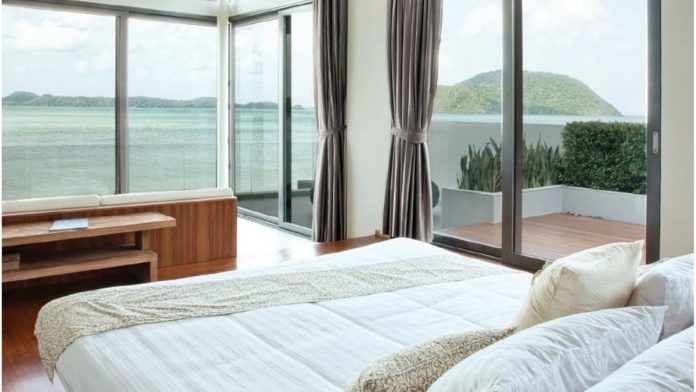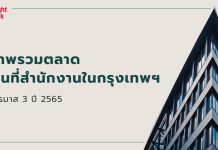Mr. Carlos Martinez, Director of Valuation and Advisory, Knight Frank Thailand said, affected by the global economic uncertainty, China-US trade war, and the appreciation of the Thai Baht, the number of domestic tourist dropped, while the number of international tourist increased only moderately in 2019 compared to previous years. With all, the total number of travelers only grew by 0.6% Y-o-Y in 2019.

The first half of 2020 has witnessed a significant plunged in the number of tourist arrivals due to the travel restrictions imposed locally and globally to prevent further spread of the ongoing COVID-19 outbreak, resulting in the plunge of the hotel occupancy rates. This situation is having a strong impact in the island as the hospitality industry represents almost half of the total GPP in Phuket.
The number of international tourists declined in the first quarter by 33.8% Y-o-Y to 1.06 million. The Chinese market, the largest international market feeder, declined as the Chinese government imposed outbound travel restrictions in January 2020.
During the poor market conditions, some hotel operators suspended their operations and some offered deep discounts on room rates, promotion campaigns and packages, to attract local customers.
Figure 1 : Phuket’s International Visitors Arrival

Supply and Demand
According to research conducted by Knight Frank Thailand, Patong beach comprises the majority of the luxury and upscale hotel supply at 24% of the total supply followed by Karon (15%), Bang Tao (14%), Kata (13%) and Kamala (10%).
In 1H 2020, only one upscale hotel opened in Phuket, providing an additional 600 rooms. New opening was Four Point by Sheraton Patong Beach (600 rooms) located in Patong Beach, Kathu district. At the end of 1H 2020, there were 22,461 luxury and upscale hotel rooms in Phuket.
Figure 2 : Phuket’s Luxury and Upscale Hotel Stock

As the number of travelers dropped due to the COVID-19 outbreak at the end of 2019, the occupancy rate of luxury and upscale hotels plummeted, falling 22 percentage points Y-o-Y to 38%. The temporarily closure of the Phuket International airport since April 2020, resulted in the lowest level of hotel occupancy rate forcing some hotel operators to suspend their operations until market recovery.
The average daily rate (ADR) of luxury and upscale hotels fell 6% Y-o-Y to THB 3,840 making this drop a record low for the past few years.
Figure 3 : Phuket’s Luxury and Upscale Hotel Performance

Outlook
Mr. Martinez concluded, in 2020, 11 hotels were schedule to open, providing about 2,431 rooms. Besides Four Point by Sheraton Patong Beach that opened in the first half of the year, the remaining might postpone their openings due to the current epidemic situation. These include Anayara Luxx Panwa Resort (44 rooms), Angsana Ocean View (116 rooms), Island Escape by Burasari Phase 2 (220 rooms), JW Marriott Phuket Resort & Spa Chalong Bay (189 rooms), and Noxu Roxy Phuket (91 rooms) in the luxury segment. Also, Dhawa hotel (150 rooms), Ramada Plaza Grand Himalai Resort (426 rooms), Utopia Mai Khao (92 rooms), Wyndham Chalong Phuket (150 rooms), and Wyndham Nai Harn Resort Phuket (353 rooms), in the upscale segment.
Phuket International Airport closure in April 3 to stop the spread of the COVID-19 caused a fall in the number of visitors. As a result, demand for hotel rooms fell dramatically. Some hotel operators kept their businesses suspended to reduce losses until clear signs of market recovery.
The airport was opened to receive domestic flights in June 16. Thus, we expect to see local tourism picking up in the third quarter, and, as global travel restrictions are lifted, international travel may return slowly during the fourth quarter, or beginning of the next year.
Overall, we expect the average occupancy rate for luxury and upscale hotels in Phuket to decrease sharply below 50%, and the ADR to drop by 5-10% Y-o-Y in 2020.
The number of tourists to Thailand is expected to hit a record low in 2020, and the occupancy rate of hotels is expected to drop drastically. The hotel industry in Thailand is facing an extremely challenging environment, with a long lasting impact from the pandemic. In the short term, Phuket’s economy dependence on the tourism industry will suffer due to the travel restrictions resulted from the COVID-19 pandemic. Nevertheless, in the long term, Phuket’s hotel sector will be bolstered by improved infrastructure, e.g., Phuket International Airport expansion Phase 2 due in mid-2020, increasing the capacity to 18.5 million passenger per year, and phase 3 by 2023-25 increasing to 25 million passengers per year, the Phuket Light Rail Transit System by 2024, and the new Andaman International Airport by 2025.
Phuket upholds an attractive position as an international and local tourist destination and keeps growing and expanding their accommodation offer. In 2019, three new shopping malls opened; Central Patong, Porto de Phuket and Blue Tree Phuket, enhancing Phuket’s attractiveness as a tourist destination.















